- Home
- Julian Barnes
Love, Etc. Page 3
Love, Etc. Read online
Page 3
Oliver In the meantime, the meantime, the only Greenwich meantime . . .
The meantime. Time is mean, that’s true. A tricky little soubrette, Time. Drags her feet and pouts her lower lip most of your life, and then just for that brief happy hour, that margarita moment when pleasure seems to be on the house, she zooms past like a waitress on rollerblades. Take the happy hour which began the instant I bent the knee in homage and troth to ma belle. How could I know it would end at approximately the moment you and I last parted company? And how to predict when the scowling minx with tray aloft would call happy hour once again? Things were a tad flat and polder-like for a while after our return to England, I do confess. Then came the annunciation of Marie. She’s a little Singapore Sling if ever there was one.
And there’s been more than the occasional frolic at the fun-fair, wallow at the waterhole, since then. The death of my father, that was a real corners-up day. Some toilsome cyclopaedists of the psyche, earnest calibrators of angst, have apparently estimated that the stress resulting from death of the father is right up there with the pain of moving house. They may have put it the other way round, but even so. In my case, I was much more worried about losing the stair carpet and the Donald Duck lampshade than the paterfamilias.
Oh, don’t make that face. You never knew my father, did you? And in the unlikely event that you did, he was never your father, he was only ever mine, the Old Bastard. Used to beat me up with a hockey stick when I was barely weaned. Or was it a billiard cue? All because I looked like my mother. All because she died when I was six and he couldn’t bear the resemblance. Oh, there were spurious pretexts: my studied insolence—my impromptu insolence as well—plus a certain juvenile zeal on my part for arson, but I knew what it was about. He was a cold fish, my father. The old halibut smoked a pipe to conceal the piscine odours. And then, one day, his scales dried out and his fins turned stiff as a cast-off paintbrush. He had expressed a yen for cremation, but I had him buried at the crossroads with a stake through his heart, just to make sure.
He left what is mockingly known as his estate—more an allotment—we are talking picayunes here, not gold moidores— in trust for Sophie and Marie. With the specific instruction that the said N. Oliver Russell should not be allowed to get his phalanges anywhere near the moolah. Also left letters addressed to the said granddaughters explaining why. The envelopes were, shall we say, lightly gummed. Inside was a mixture of magical realism and hard-core libel. For the children’s sake, I cast them into some convenient oubliette. My wife disgraced me by crying at the funeral. There had obviously been a three-line whip at the Old Folkery where Monsieur Halibut passed his sunset years, and the tiny flint-’n’-brick tabernacle was full of replacement hips and dental implants belting out their belief in the resurrection of the body, a concept alarming enough at the best of times, but transcendently poo-scary in the present instance. Doubtless Gillian found it all strangely poignant in a left-field, time-of-the-month kind of way. So she blubbed, despite the firm restraining hand I laid on her. Then it was back to the Old Folkery to hear tales of Papa’s derring-do with zimmer frame and colostomy bag. I speak in a general sort of way, as is often the case.
Have I drifted a little from my narrative? Well, such are the privileges of the oral tradition. Don’t snap at me, please, I’m much more sensitive nowadays. So. Let me try to tabulate my last decennium à la façon de Stu. We left France. Gill took us out there; Gill brought us home. What did I say about every marriage containing one moderate and one militant? Our little village house of custard stone was sold to a nickel-fucking Belgian. Alas, not one of the Famous Six. And you know the next bit. Cue Stuart, the man from the life insurance ad on the telly: Once You Get Out of the Property Market, It’s Very Hard to Get Back In. You never said a truer word, Stu-baby. An idyllic sun-warmed Languedoc hideaway with mature vegetable garden buys fifty percent of a chimney stack in a London postal district whose digits I blush to mention. Even the postman gets lost coming out here. Occasionally you might see a bus, if some disgruntled local manages to hijack one at gunpoint and make it perform a useful social service.
Our union has been blessed with further offspring. Marie, sister to Sophie. How the little ones love their dear papa. They cling to me like a wet shower curtain. Sophie is the serious one, wants everything to be perfect. Marie shows signs of being a proper little madam.
Have I used it before? The line about the shower curtain? You’re rather giving me the eye. It’s the price of being an entertainer. You scatter your bons mots like bonbons and every so often someone in the front stalls throws a sweetpaper back. Hey, you, we’ve had this flavour before. Listen, there aren’t that many types of jellybean in the world. You’ll be complaining next that all the stories ever written are merely variants on a set prime number of plots. Well, I should know about that, given the screenplay I currently have in development. In development in my head, that is. I confess that some of my artistic ventures over the last decade have had rather triste dénouements. I have on occasion been driven back, like a dog returning to its vomit, to Mr Tim’s College of English, all to earn the odd drachma and put a stuffed vine leaf on the family table. I fear the spirit of nine-to-five was never very resilient in Oliver.
But across the land it flourishes like the green bay tree. Is it just that I notice these things more? In the years since we returned to Londinium Vetus from the Land which knoweth not the Brussels Sprout, it has increasingly struck me that the disparity between success and failure has never been more—can we escape the word for once? I think not—vulgar. On the one hand, the lustrous off-road vehicles, the Chargers and Thrusters and Cruisers and general Superturbo Bullybags. And on the other, the frail pizza-delivery lads on frankly underpowered motor scooters, shamefacedly rearranging their customers’ toppings as they hurdle a speed bump. Do the pushy power-steerers high above the traffic give a thought to the puttering purveyors of Four Seasons with Extra Onion, hold the Tomato, not the tomato paste just the fresh tomato, and extra pepperoni and extra peas as well? Do they give a toss? If hypocrisy is the tribute vice offers to virtue, then style used to be the tribute rich offered to poor. Not any more.
And another thing. If they’re called off-road vehicles, why are so many of them on the fucking road? Answer me that if you can.
Did you read about those snowfalls in the American Midwest last winter? The snow was as high as an elephant’s eye (that’s one for you, Stuart). The farmers knew what to do, being, well, farmers, and only left their instant igloos with old-fashioned tennis rackets strapped to their boots. The humble blue-collar worker knew to stay home, fire up the microwave and rewind his Superbowl Highlights tape. Whereas those who were truly fucked were the bourgeois cavaliers in their off-road vehicles, eager for the chance to show all those low-lifes and underachievers and dullards and rubes and faggots out there how splendid and enviable it is to prance wherever thou wist across the snow crust in four-wheel comfort. But just to prove that there is some sub- or super-lunary justice in this world, they all, every one of them, got stuck up to their relevant pistons or turbines, and had to be dug out by huskies and Mounties.
Do you think there is? Justice in this world, I mean? Do you think virtue is rewarded, vice punished? Do you take the view that virtue is its own reward? Always a rather masturbatory implication to that, I feel. Presumably virtue must learn to be self-pleasuring because nobody else is going to diddle it. Is the same true of its opposite—that vice is its own reward? That sounds closer to the mark. The voluptuary would not indulge if the rewards of volupté were not what drew him. Whereas those who comfort the leprous, rend their longjohns into bandages, and generally turn up like a St Bernard on a snowmobile to succour the frost-bitten off-roader—do they get a buzz from the moment of rescue? Is that what the proverb means: that the Lord isn’t going to tip them a food stamp for their labours, so they might as well seize what volupté they can?
I’m merely a binoculared student of the passing caravanserai of life. Y
ou might find my conclusions rather DIY. But I can’t help thinking that most of the time vice gets away with it.
You want a second opinion? I don’t blame you. Try this then, from an old Toulousain heretic: ‘God is perfect; nothing in the world is perfect; therefore nothing in the world was made by God.’ Not bad, eh?
5
NOW
Terri Mind if I join you? I mean, is this a private thing or what? I could e-mail if you prefer. But I’ll tell you one thing, I’m not having five years of my life tossed in the trash like that. I’m not going to be anyone’s damn footnote.
When Stuart hired me as maitresse D, he got a good deal and he knew it. A chef may be great or a chef may be shit, but without front-of-house he’s got no chance. That’s where a restaurant starts. On the phone, at the desk, at the coat-check, in the bar. Skills required: keeping a client happy when he arrives on time and his table isn’t ready; dealing with the booking for two that turns up as six; hurrying a table along without letting it know it’s being hurried. Little things, big things. Not letting it show on your face when the guy who was so deeply married eight-thirty every Friday starts bringing in his girlfriend on Tuesdays as well. Knowing when a woman asks for the check if it’s because she’s paying or because she’s bored out of her skull. Neutral placement of the check if you aren’t sure. Little things, big things.
I was good at all that, so people thought our chef was great even if he was only fair. And when Stuart started sourcing the best organic produce, that could have made him definitely great, except it really pissed him off, because chefs prefer their own suppliers for reasons they keep to themselves. Like, sauces aren’t the only things they need to skim, if you follow me.
So we got ourselves a new chef, a better one to start with, except he got pissed off too because he said Stuart didn’t know how to buy fish. Meat, vegetables, fruit, OK, but fish, no way. So I was like the UN between the kitchen and the office on top of the front desk. Which, to give Stuart his due, he appreciated.
We have our picture of Brits, especially in a city like Baltimore, which is a very American city in case you never heard. Wallis Simpson came from Baltimore, the one who married your King. We don’t get too many of you coming through, so we buy into the stereotype, which is that Brits are snobby and stick together and don’t pick up the tab for drinks if they can possibly avoid it. Oh, and most of the men are tea-bags, if you’ll pardon the expression. But Stuart wasn’t like that. He was a little reserved at first, but he paid full market wages and actually seemed to like Americans. When he asked me for a date I said no, just like that, because I never date in the workplace, never have. Then he came on all Masterpiece Theatre if you know what I mean, about not understanding American etiquette, and respecting me saying no, but might there not, under our mysterious social code, be something in the ballpark between a working relationship and a full date, to which I might, without compromise, feel able to agree. I said: well you can buy me a drink if that’s what’s on your mind. And we both just laughed.
We took it from there. Look, I’m not going to give you the full picture. Not unless you get down on your knees and beg. But I’d like to say something, before you get in any deeper. Stuart’s account of his life probably goes like this: slow out of the blocks, bad first marriage, comes to the States, goes into business, makes a success of it, has a good enough second marriage, it doesn’t go the distance, then an amicable divorce, he gets nostalgic for England and decides to apply his business skills back home. Another American success story, don’t we just love ’em. Man screws up his life, gets focussed, moves on.
Well, everyone’s entitled to their own life story, sure; that’s another American freedom. Believe it if you want. Believe it for now.
Stuart My key words are transparency, efficiency, virtue, convenience and flexibility. Basically, the market divides three ways. Number one, mail order direct from the producers—this works best for meat and poultry—so you know exactly where it comes from. That’s transparency. Number two, the supermarkets, who came into the game a bit late, but know how to display and sell, and how to source. That’s efficiency. Number three, the local outlets, which are often higgledy-piggledy, like thrift shops, with sacks of filthy recycled plastic bags and dopey staff who really like to finish their conversations with one another before they do anything as humiliatingly businesslike as actually sell you some leeks. That’s virtue. Now the modern organic consumer, in my book, is entitled to the best of all three worlds: knowing where the produce comes from, being treated like a proper customer, knowing that what they are doing is right and being prepared to pay a little extra for it. Add in convenience and flexibility and you’re there. So I did my research and signed up a few key exclusivities. Eggs, bread, milk, cheese, honey, fruit and veg: those are the bedrock. Fish, no; meat, yes. A few people might be put off by the sight of meat, but I’m not after hard-liners and idealists. I’m after the traditional customer with enough discretionary income and good sense to go organic, who also appreciates one-stop shopping. I don’t bother with peripherals like organic wine and beer. I don’t try and turn the place into a teashop. Forget the milkchurns of bean soup. Lose those amateurish handwritten signs full of exclamation marks. Hire staff who know how to answer questions and are keen to bag. Tall, brown-paper bags double-folded at the top. Home deliveries. On-line ordering. Special meet-the-supplier events. A monthly newsletter.
You might think that’s all pretty obvious. But I never claimed to be a blindingly original thinker. On the whole, blindingly original thinkers go bust. And as I said, some clichés are true. I just looked at the market, worked out what people wanted, did my research and then my sums. I call my shops The Green Grocer. Do you like it? I’m rather proud of it myself. I’ve got four outlets at the moment, with another two opening next year. I get recommendations on the food pages and in the colour magazines. Someone on the local paper wanted to do a profile of me the other month but I turned it down. I didn’t want the news to get out that way. I wanted to wait until the time was right, when I was settled. Which is now.
Gillian When I said it’s been tough on Oliver, I meant it. I’m the one who has the job, who gets out of the house, who meets new people. Oliver’s the one still waiting for things to happen.
There was this suggestion in the papers recently that marriage should be treated as a business. Romance never lasts, they said, so couples should negotiate the terms of their partnership in advance: all the conditions and clauses, rights and duties. Actually, it doesn’t sound to me like a new idea at all. It reminds me of those old Dutch paintings—husband and wife side by side, gazing out at the world a little complacently, the wife sometimes holding the purse. Marriage as business: look at our profits. Well, I absolutely don’t agree. What’s the point if the romance isn’t still there? What would be the point if I didn’t want to come back to Oliver every evening?
Of course we talk about arrangements a lot. That’s like any normal marriage. Children, shopping, meals, pick-up times, homework, television, the school run, money, holidays. Then we fall into bed and don’t have sex.
Sorry, that’s one of Oliver’s jokes. At the end of a long day, when work’s been a problem and the girls have been a handful, he’ll say, ‘Let’s just fall into bed and not have sex.’
My father—he was a teacher—ran off with one of his pupils when I was thirteen. You knew that, didn’t you? Maman never refers to it, or to him—won’t even mention his name. I sometimes think, what if he hadn’t? What if he’d nearly gone, then changed his mind—decided that marriage was a business—and stayed? Think how many lives would have been completely different. Would I be here now?
I was reading a book the other day—by a woman—and at some point she said something like—I haven’t got it here so I can’t quote it exactly—something like every relationship contains within it the ghosts, or the shadows, of all the other relationships it isn’t. All the abandoned alternatives, the forgotten choices, the lives you could have
led but didn’t and haven’t. I found this thought enormously consoling because it was true, and at the same time enormously upsetting. Do you think that’s just a part of growing up, or growing older, whatever we like to call it? I suddenly felt terribly relieved that I’d never had an abortion. I mean, it’s lucky—I didn’t have anything against it in principle when I was younger. But imagine thinking about that in later life. What never happened. The abandoned alternatives, the unled lives. It’s bad enough thinking about it in the abstract. Imagine what it would be like if it was that real.
This is what my life is like now.
Mme Wyatt ‘Marriage comes after love as smoke comes after fire.’ You remember? Chamfort. Was he saying only that marriage is the inescapable consequence of love, that we cannot have one without the other? A piece of wisdom that is not worth writing down, no? So he is inviting us to look at the comparison more exactly. He is saying, perhaps, that love is dramatic and hot and burning and noisy, while marriage is like a warm fog which stings your eyes and makes it impossible for you to see. He is saying perhaps also that marriage is something blown about by the wind—that love is fierce and burns the ground it stands on, while marriage is a more incoherent condition which can be altered and dissipated by the lightest breeze.
I think this, also, about the comparison. People suppose that when they light a match, the hottest part of it is in the centre of the flame. This is a mistake. The hottest part of the flame is not inside it, but outside it, just above it, in fact. The hottest place is where the fire ends and the smoke begins, exactly there. Interesting, hein?

 The Sense of an Ending
The Sense of an Ending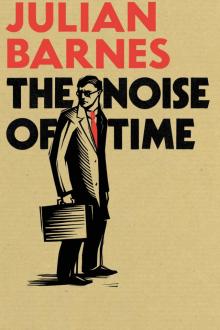 The Noise of Time
The Noise of Time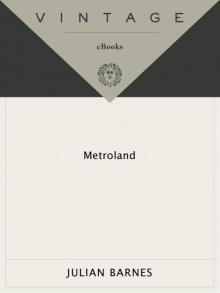 Metroland
Metroland Letters From London
Letters From London Before She Met Me
Before She Met Me Pulse
Pulse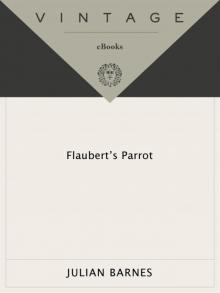 Flaubert's Parrot
Flaubert's Parrot England, England
England, England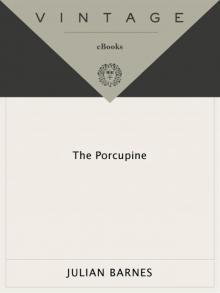 The Porcupine
The Porcupine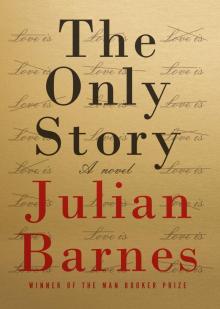 The Only Story
The Only Story Love, Etc
Love, Etc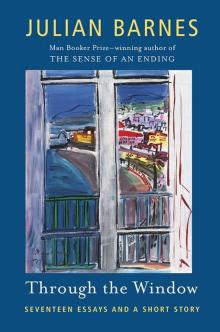 Through the Window: Seventeen Essays and a Short Story
Through the Window: Seventeen Essays and a Short Story Staring at the Sun
Staring at the Sun Cross Channel
Cross Channel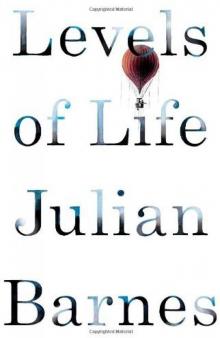 Levels of Life
Levels of Life Arthur & George
Arthur & George Love, Etc.
Love, Etc.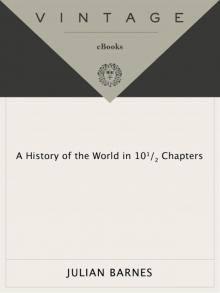 A History of the World in 10 1/2 Chapters
A History of the World in 10 1/2 Chapters Something to Declare
Something to Declare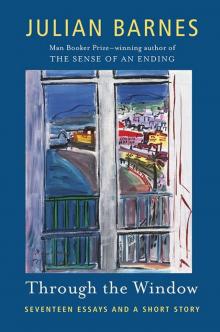 Through the Window: Seventeen Essays and a Short Story (Vintage International)
Through the Window: Seventeen Essays and a Short Story (Vintage International)